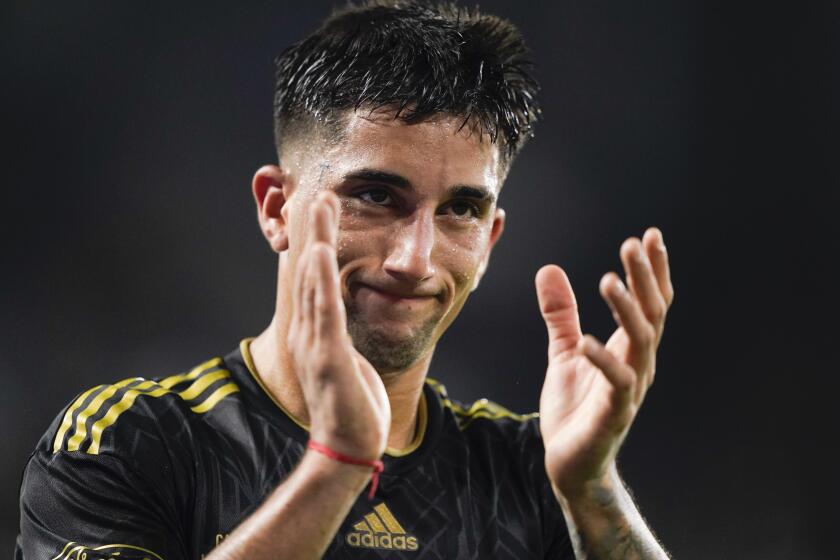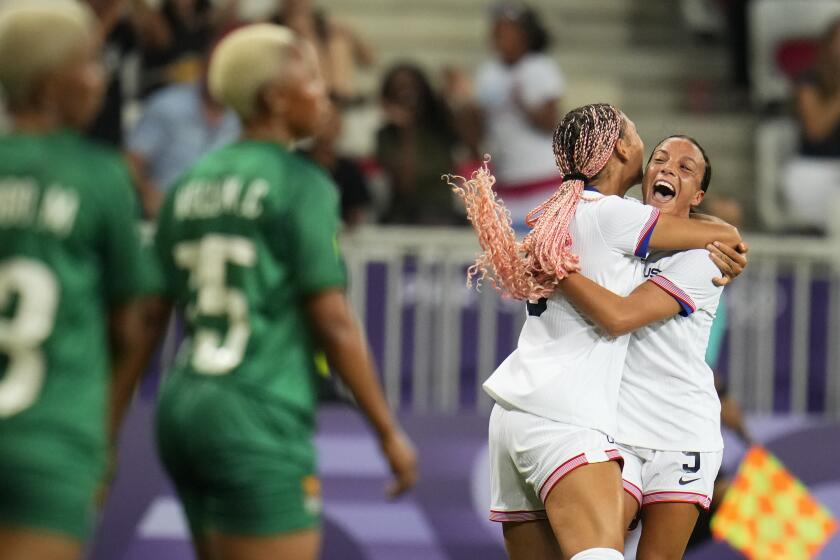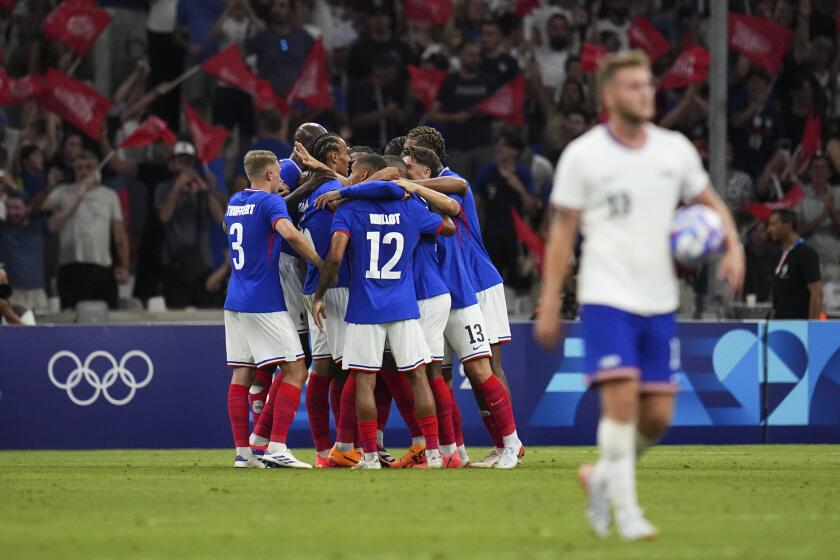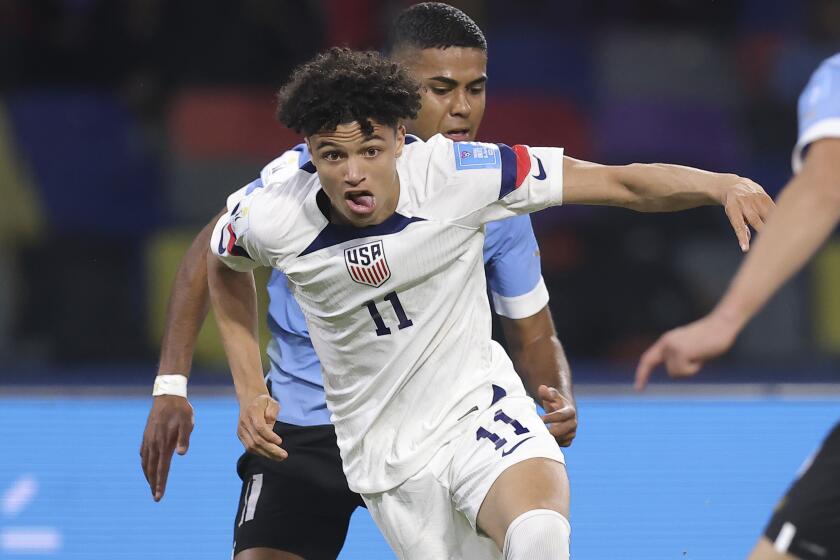POLITICAL FOOTBALL
They’ll be watching in Tehran. I wonder if they’ll be watching in Arkansas.
The most politically charged soccer match in years takes place here today when the United States and Iran square off at Stade de Gerland in a game both countries have to win and whose implications extend far beyond the painted sidelines.
All the way to the Oval Office, in fact.
Having finally realized what his counterparts around the world long have recognized, President Clinton last week belatedly woke up to the fact that the World Cup might present a political opportunity.
He said he hoped today’s match “can be another step toward ending the estrangement between our nations.”
There doesn’t seem much chance of that. Despite the efforts of the two coaches, Steve Sampson and Jalal Talebi, to defuse a potentially explosive occasion, the tension remains thick in both camps.
The United States and Iran have been without diplomatic relations for almost two decades, ever since the 1979 Islamic Revolution and subsequent hostage crisis. Apart from a couple of wrestling events, the countries have not met on the sporting field.
Today, they clash head-on in a match that Hank Steinbrecher, U.S. Soccer’s executive director, last December called “the mother of all games.”
It was a flippant and unfortunate phrase, but it is fair to say that for both countries this is the one and only World Cup ’98 match that matters.
Clinton, of course, might have been soccer-savvy enough to realize that there is an even chance the U.S. team will be beaten. And the last thing the White House needs is to be associated with another loser.
So perhaps the president has purposely kept his distance. Not so, other national leaders.
To the dismay of World Cup coaches who dislike having their routines disrupted and their players distracted by publicity-seeking politicians, more than a few elected leaders have chosen to cash in on the World Cup hoopla.
For example:
* Italian Prime Minister Romano Prodi drew the scorn of Coach Cesare Maldini by trying to get involved in team selection. Prodi suggested publicly that both Roberto Baggio and Alessandro Del Piero be picked to play against Cameroon.
In a neat swipe at Prodi’s lack of soccer knowledge, Maldini shot back: “I believe that Prime Minister Prodi is a great admirer of cycling.” He then paused long enough for Italian journalists to pick up the cue and shout back: “And he should stick to that.”
Prodi has not been heard from since.
* South African President Nelson Mandela was more diplomatic. All he did was call team captain Lucas Radebe after the loss to France and offer encouragement. It worked and South Africa tied its next game.
* Morocco’s Crown Prince Sidi Mohammed, after an official visit with French President Jacques Chirac and Prime Minister Lionel Jospin, extended his stay to attend Morocco’s game against Brazil.
He should have set aside his crown for a while, because Morocco could have used him in the nets. It lost, 3-0.
* Going to another extreme, one of the candidates in the Venezuelan presidential elections has promised that if she is elected, Venezuela will qualify for the 2002 World Cup.
Former Miss Universe Irene Saez’s lame-brain idea doesn’t stand a chance of wooing voters. Venezuela will win the World Series before it qualifies for the World Cup.
* British Prime Minister Tony Blair was dragged into the France 98 tournament, whether he liked it or not. Apart from having the score of England’s game against Tunisia brought to him every 15 minutes while he took part in a European Union debate in Cardiff, Wales, on Europe’s future he had to deal with the English hooligan debacle in Marseille.
To quote him indirectly, what he said was much the same as other English politicians have said ever since the low-life problem erupted three decades ago. That is to say, “Waffle, waffle, promise, shame, waffle, waffle, excuses, waffle, not my fault.”
Thank you, prime minister.
* Thaksin Shinawatra, the former deputy premier and foreign minister of Thailand and a telecommunications millionaire, delayed the launch of a new political party until after the conclusion of the World Cup because, he said, no one in Thailand is paying attention to anything but the soccer.
* Jamaican Prime Minister P.J. Patterson visited Chaumont, France, about 165 miles southeast of Paris and the headquarters for Jamaica’s team in its first World Cup and lunched with the national team at their chateau in Arc-en-Barrois.
* Colombian President Ernesto Samper telephoned Alvaro Fina, head of the country’s soccer federation, to try to get him to persuade Coach Dario Gomez to change his mind about kicking troublesome striker Faustino Asprilla off the team.
Gomez didn’t change his mind. Instead, he said he would quit after the World Cup because he was tired of criticism from “these ignorant presidents.” He meant the presidents of Colombia’s club team who have called for his scalp. At least, that’s what he said he meant.
Sampson, meanwhile, has not had any of these problems. He has been pretty much left alone by U.S. politicians. The only one who has said much of anything is Secretary of State Madeleine Albright, who has expressed interest in reestablishment of diplomatic relations between the United States and Iran.
That doesn’t mean the U.S. coach hasn’t had to cope with a constant barrage of questions about how it feels to be a pawn of “the Great Satan,” as Iran’s leaders have referred o the United States.
To his credit, Sampson has remained remarkably restrained and diplomatic. He has tried, whenever possible, to keep the focus on the field of play, not on politics or the past.
“I was a part of the generation that lived through [the hostage crisis] and I understand the significance of it,” he said, “but it’s very difficult to impart that to our players [who were children at the time].
“They really want to be known as a soccer team first. And I don’t think there’s going to be any additional motivation because they’re playing against Iran.
“The flip side of that is that the Iranians, I think, will come into the match with an enormous amount of emotion. ‘The Great Satan’ is their opponent and they don’t want to go home disgraced.”
Sampson said he understands that millions of Iranians, both in Iran and the United States, have no quarrel with Americans. But old wounds are being used as motivators for today’s game.
“It’s just the rhetoric that exists within the media and from the government,” he said. “And I think in part maybe their soccer federation and their coaching staff is trying to use this as a motivator against the United States. That would all make sense to me. You use every tool you have to motivate your team.
“Why visit Khomeini’s resting place in preparation for a soccer match?”
Although the game means a great deal politically to Iran, Sampson said it does not mean as much to him, politically.
“With all due respect to the people who suffered in that time, I don’t think about the political implications of this match,” he said. “I really just want to get three points [for a victory]. That’s really all I care about.”
Not that a victory will mean all that much in the U.S.
“There’s not much we can brag about [by] beating the Iranians,” Sampson said. “We’re certainly not going to be paraded down Main Street if we do. Whereas they will be.”
As long as soccer remains the most popular sport on the planet, politics will always be its bedfellow. But sometimes that’s a good thing. The world’s leaders could learn a thing or two from Richard Butler about what’s important and what is so much hot air.
Butler, the chief United Nations weapons inspector, is currently on a more-than-tricky assignment in Iraq, where he is supposed to be searching for hidden weapons of mass destruction.
But the first thing the Australian asked for when he arrived in Baghdad last week was a television set--so he could watch France 98. The Iraqis, who are huge soccer fans, obliged.
Maybe there’s hope for us all yet. Even those in Arkansas who probably won’t be tuning in to today’s match.
(BEGIN TEXT OF INFOBOX / INFOGRAPHIC)
SATURDAY’S RESULTS
Mexico: 2
Belgium: 2
*
Netherlands: 5
South Korea: 0
*
Croatia: 1
Japan: 0
*
TODAY’S GAMES
United States vs. Iran: Noon, Ch. 7, 34
Yugoslavia vs. Germany: 5:30 a.m., ESPN, 34
Argentina vs. Jamaica: 8:30 a.m., ESPN2, 34





